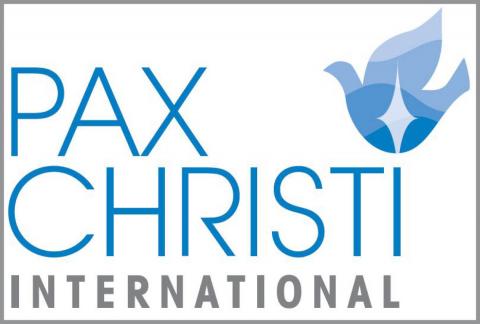Historic Vatican Conference on Nonviolence and Just Peace
by Ken Butigan
Editor’s Preface: We are posting today three interrelated articles about the remarkable Vatican conference concerning nonviolence and just peace, including this essay by Ken Butigan, Pax Christi International’s statement, and Pope Francis’s greeting to the conference members. The theory of “just war” has been the prevailing Church doctrine since postulated by Saint Augustine in the 4th century (CE). There have been previous attempts to redefine or challenge it, most notably Vatican Council II’s statement condemning war (mentioned in Pope Francis’s article below) and Thomas Merton’s many essays on nonviolence and pacifism, especially those collected in Passion for Peace: The Social Essays, (New York: Crossroad, 1996). In the lead essay from that volume, “The Root of War is Fear”, written in 1961 for The Catholic Worker, Merton writes that the “duty of the Christian . . . is to do the one task which God has imposed upon us in the world today. That task is to work for the total abolition of war.” But nuclear weapons signify a new reality demanding new paradigms. This conference engages the struggle. JG
The atmosphere of an unprecedented gathering on nonviolence at the Vatican — where change-makers from every part of the globe deliberated with priests, bishops and the Catholic Church’s top officer for justice and peace — was electric from beginning to end.
The “Nonviolence and Just Peace Conference: Contributing to the Catholic Understanding of and Commitment to Nonviolence” took place in Rome, from April 11-13. Eighty-five lay people, theologians, members of religious congregations, priests, and five bishops traveled from Africa, the Americas, Asia, Europe, the Middle East, and Oceania to take part in this landmark gathering, which I helped to organize. Many participants live and work in contexts of extreme violence and injustice, and came seeking a bold new direction from the global church.
The Vatican’s Pontifical Council for Justice and Peace, Pax Christi International and other Catholic organizations from around the world sponsored the first-of-its-kind assembly.
The head of the Pontifical Council, Cardinal Peter Turkson, opened the conference with a warm message of support from Pope Francis, who said, “Your thoughts on revitalizing the tools of nonviolence, and of active nonviolence in particular, will be a needed and positive contribution.” The gathering ended three days later with a dramatic consensus process that called on the Pope to issue an encyclical — a major Catholic church document — on active nonviolence.
Taking the pope’s words to us seriously, the conference’s final text urged the church to integrate nonviolence at every level of the global institution — including in the dioceses, parishes, agencies, schools, universities, seminaries, religious orders and voluntary associations — and also called on it to no longer use or teach the so-called “just war” theory.
The conference’s final document, “An Appeal to the Catholic Church to Re-Commit to the Centrality of Gospel Nonviolence”, was delivered to Pope Francis shortly after the conference concluded. Confessing that we and the Catholic Church had betrayed Jesus’ nonviolence many times, including by “participating in wars, persecution, oppression, exploitation and discrimination,” we concretely proposed that the church “promote nonviolent practices and strategies (e.g., nonviolent resistance, restorative justice, trauma healing, unarmed civilian protection, conflict transformation, and peace-building strategies); initiate a global conversation on nonviolence within the Church, with people of other faiths, and with the larger world to respond to the monumental crises of our time with the vision and strategies of nonviolence … continue advocating for the abolition of war and nuclear weapons; and lift up the prophetic voice of the Church to challenge unjust world powers and to support and defend those nonviolent activists whose work for peace and justice put their lives at risk.”
This landmark gathering had been in the works for over a year. In March 2015, I joined the planning committee, which involved those of us from El Salvador, the Philippines, Japan, Italy, Australia, Britain and the United States working with the Pontifical Council to craft an agenda that would be interactive and productive. Marie Dennis, the co-president of Pax Christi International, drew on her considerable experience of organizing international gatherings to create a process where everyone would be heard.
The “Nonviolence and Just Peace Conference” was an astonishing experience, and we hope that it will bear great fruit in the Catholic Church and the larger world. As José Henríquez, a member of the planning committee and recent past secretary general of Pax Christi International from El Salvador put it, “We live in a complex world where armed conflicts are pervasive and where violence has become the first — and many times the only — way to address those conflicts. As a global community, we need to foster the creative imagination to build merciful societies where nonviolence is the norm and not the exception. At this historical turning point, we invite people everywhere to spread this call for nonviolence and just peace.”
EDITOR’S NOTE: Ken Butigan is director of Pace e Bene, a nonprofit organization fostering nonviolent change through education, community and action. He also teaches peace studies at DePaul University and Loyola University in Chicago; article courtesy wagingnonviolence.org.





